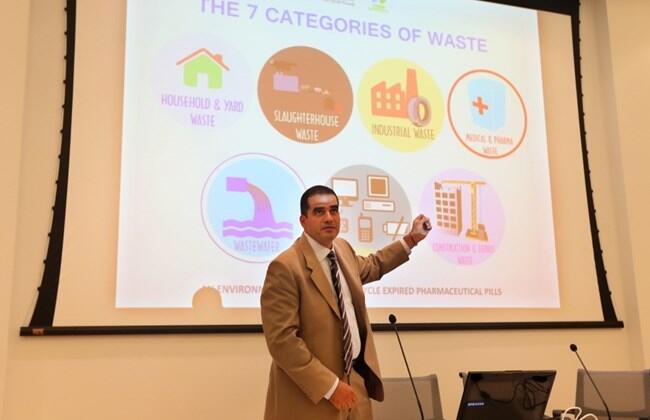The childhood friends presented the results of two years of research at a seminar entitled “An Environmental Method to Recycle Expired Pharmaceutical Pills” Tuesday at the Issam FaresAuditorium at AUB. The talk was attended by representatives from the Health Ministry, the Environment Ministry and various municipalities. At present, several methods are used for the disposal of expired drugs. Pills end up in landfills, are incinerated or are shipped abroad under the provisions of the Basel Convention. But these are not sustainable solutions. Drugs deposited in landfills can end up seeping into the soil, while incineration releases harmful toxins into the atmosphere. The Basel solution is costly and unsustainable, as pills shipped abroad are ultimately incinerated or disposed of in landfills anyway. One ton of waste recycled under the Basel Convention can cost up to $8,000, according to Abichaker, and the paperwork can take years to process. The key question is of containment. How can we store harmful substances so that they remain insulated as much as possible, without causing further pollution? Enter the Eco-Board. The brainchild of Abichaker, the Eco-Board is the result of a novel method of reusing previously unrecyclable plastic waste. A process devised by Cedar Environmental transforms unrecyclable material into a sturdy, waterproof polyethylene board. No harmful substances or additives result from the process, and the board has a number of potential applications in the construction sector. Borrowing from methods used to store radioactive waste, Saad was able to devise a process to integrate expired pharmaceutical pills into the matrix of the Eco-Board itself. His tests demonstrated that when pills are stored within the Eco-Board, containment is 25 to 70 times better than at landfills, and results in no leakage. Expired pharmaceutical pills are stored within the Eco-Board and then surrounded by two layers of impervious polyethylene and a layer of aluminum. The disposal of expired pills through this method could be realized in a number of projects. The first and least desirable course would be to integrate the pills into thin Eco-Boards capable of holding 500 individual pills. Such Eco-Boards would then be stored within a 1,000 square meter space. A total of 560 million pills could be safely stored in such an area. A second scenario would involve integrating the pills into Eco-Boards used in fixed green wall structures – vertical gardens that provide a habitat for plants to grow. The project has already been successfully implemented with Eco-Boards at a local park in Beirut. “Imagine walking out to Hamra and being surrounded by something so beautiful, which at the same time provides a safe way of disposing of waste,” Abichaker said. A third scenario would entail fabricating street recycling bins out of the pill-infused Eco-Boards. When asked about the future Saad said, “The next step is conducting more tests, but we anticipate coming toward a bottleneck when it comes to dealing with the regulators.” Abichaker stressed that the ultimate motive behind the project was to showcase “local talents providing local solutions.” “As Lebanese who have been educated abroad and willingly come back, we can do much more for our country than participate in demonstrations, we can solve local problems, and that is the message I am trying to get across.” Nazih Osseiran| The Daily Star











